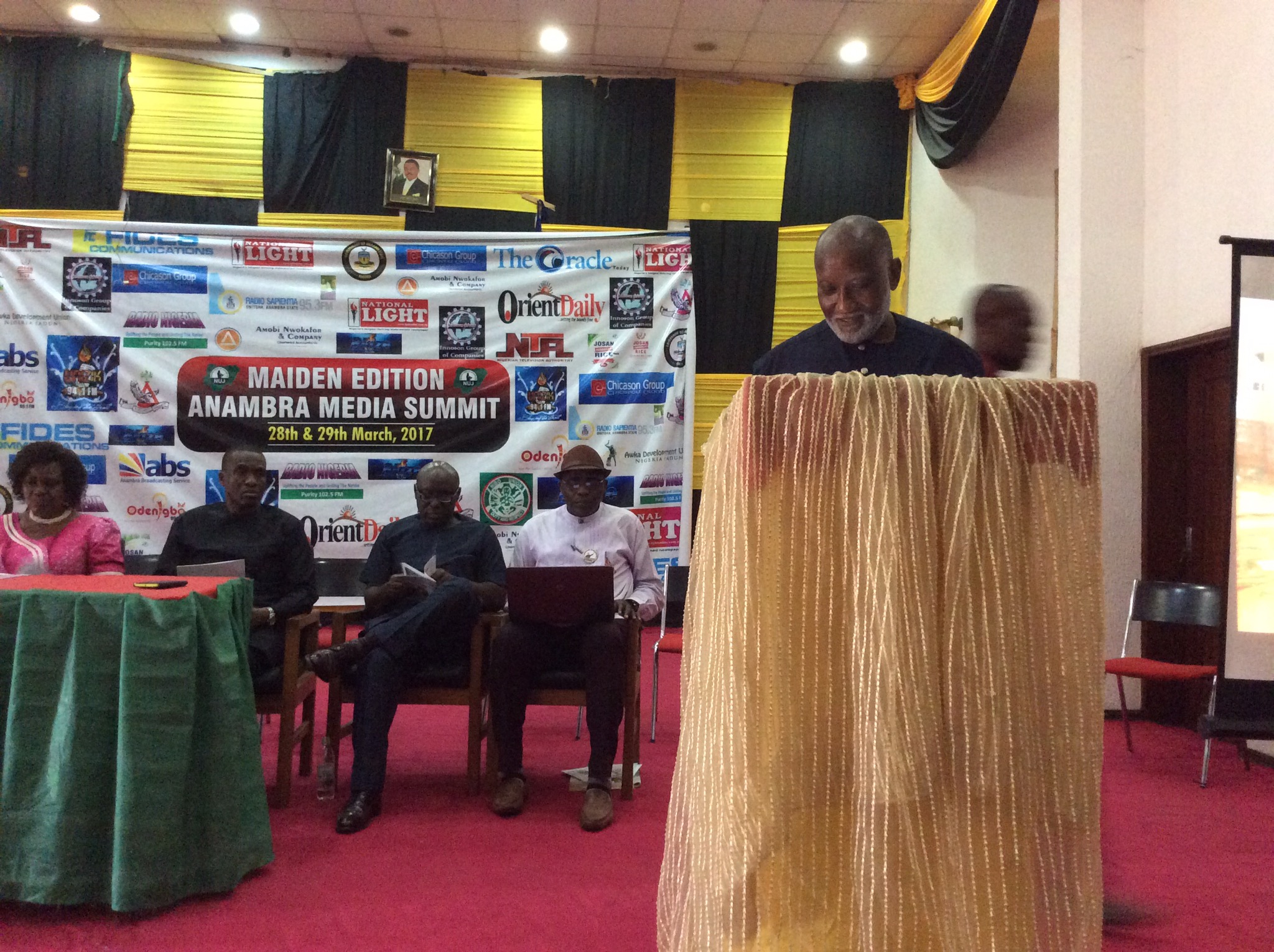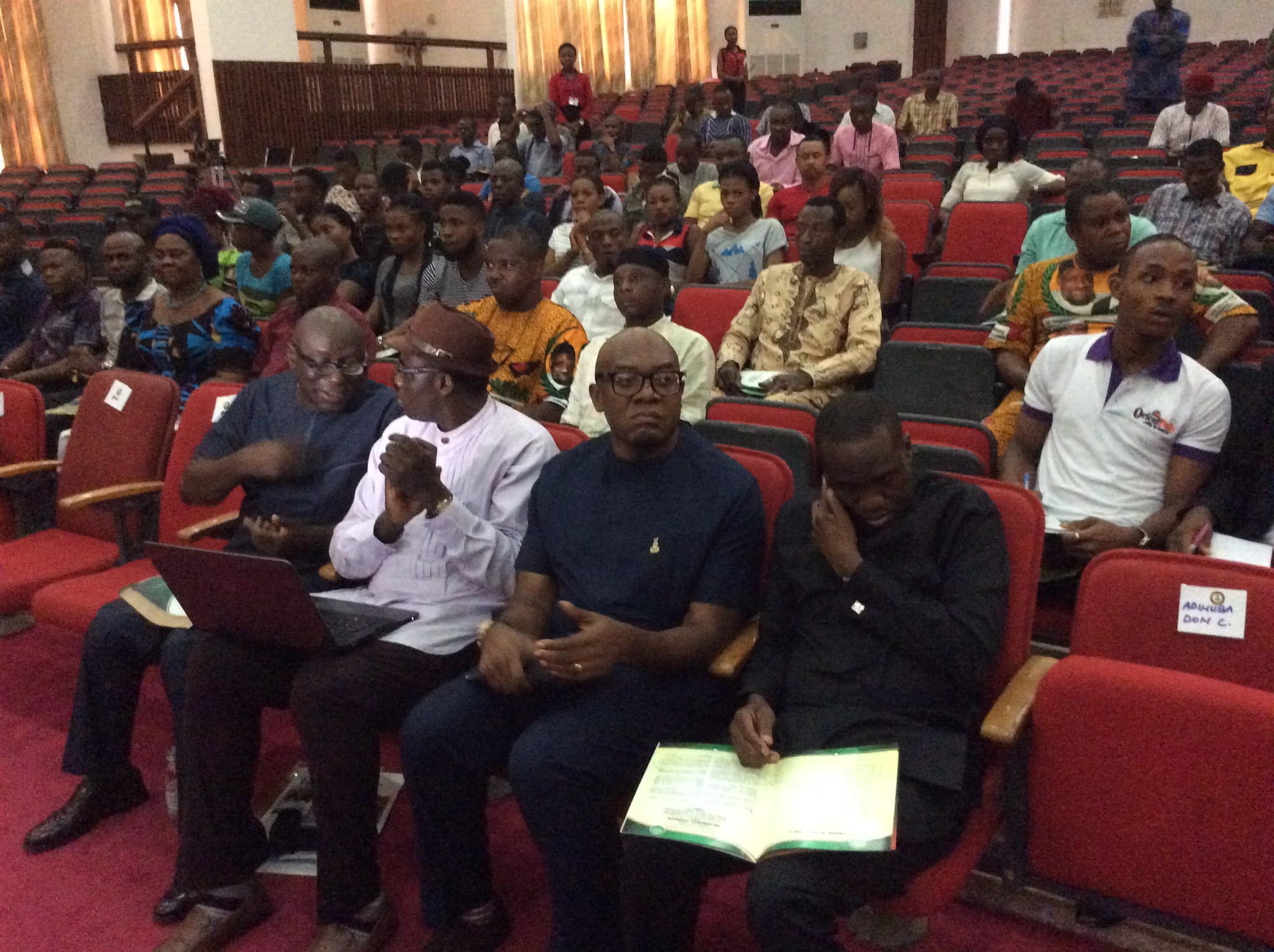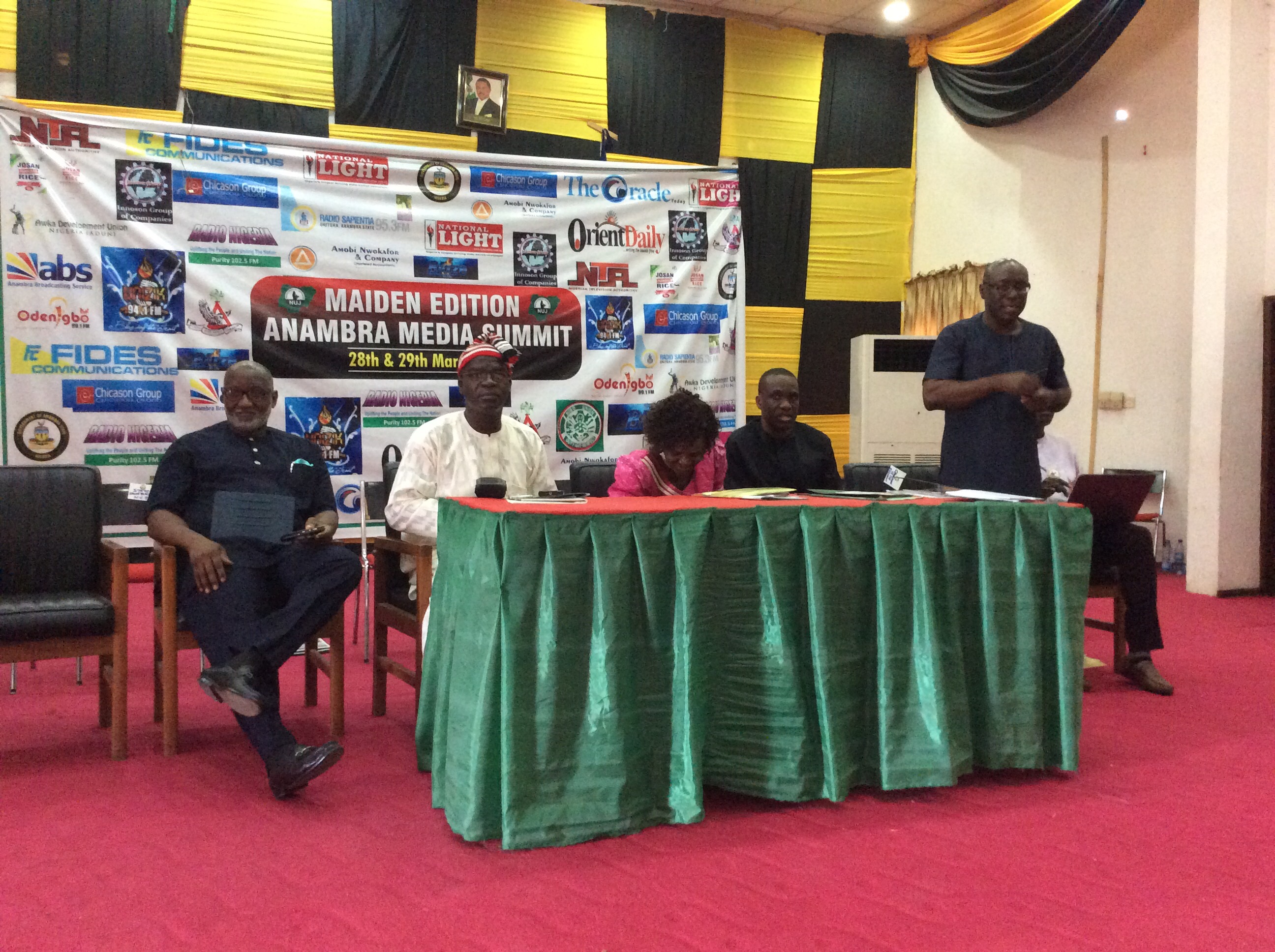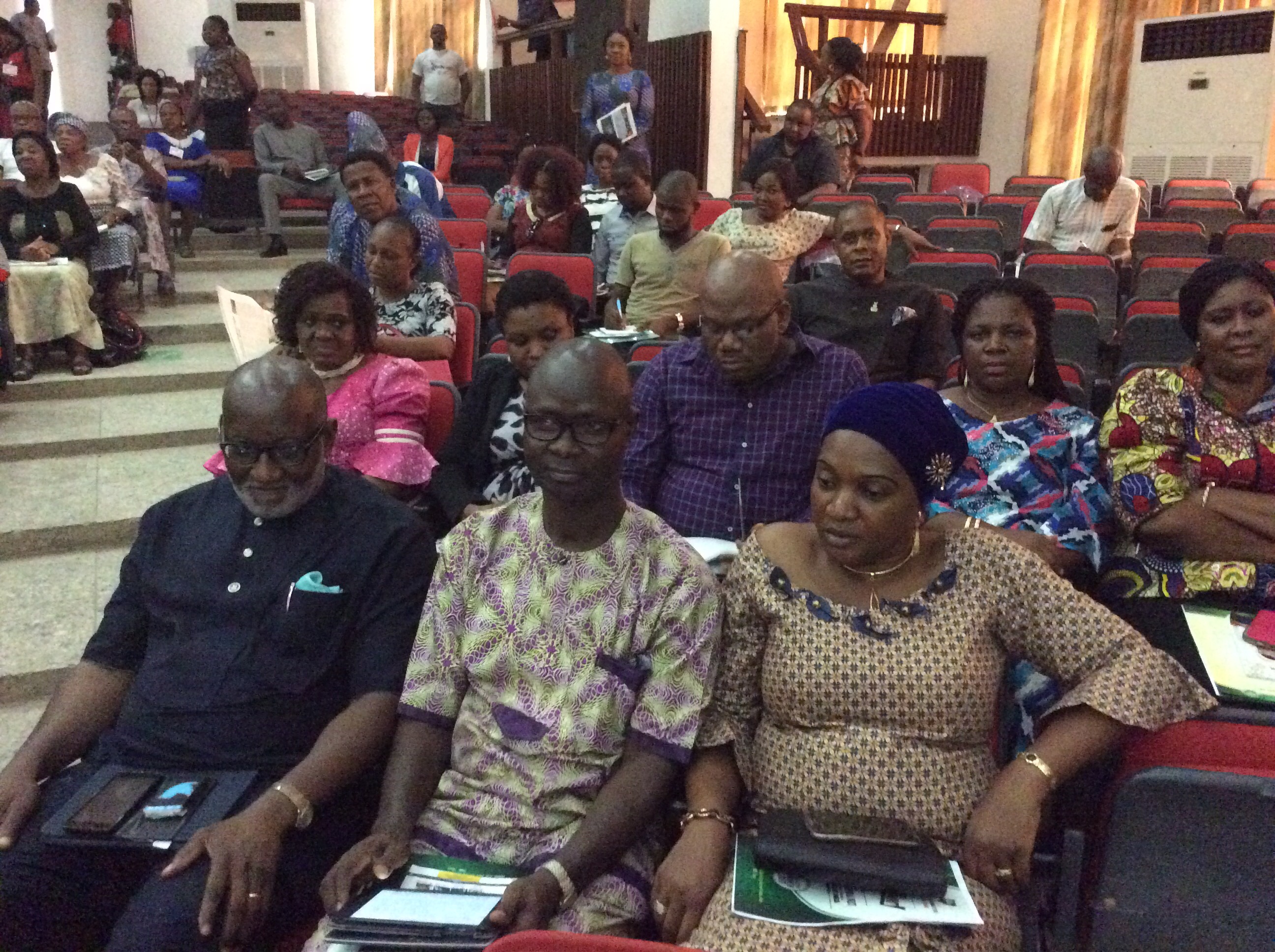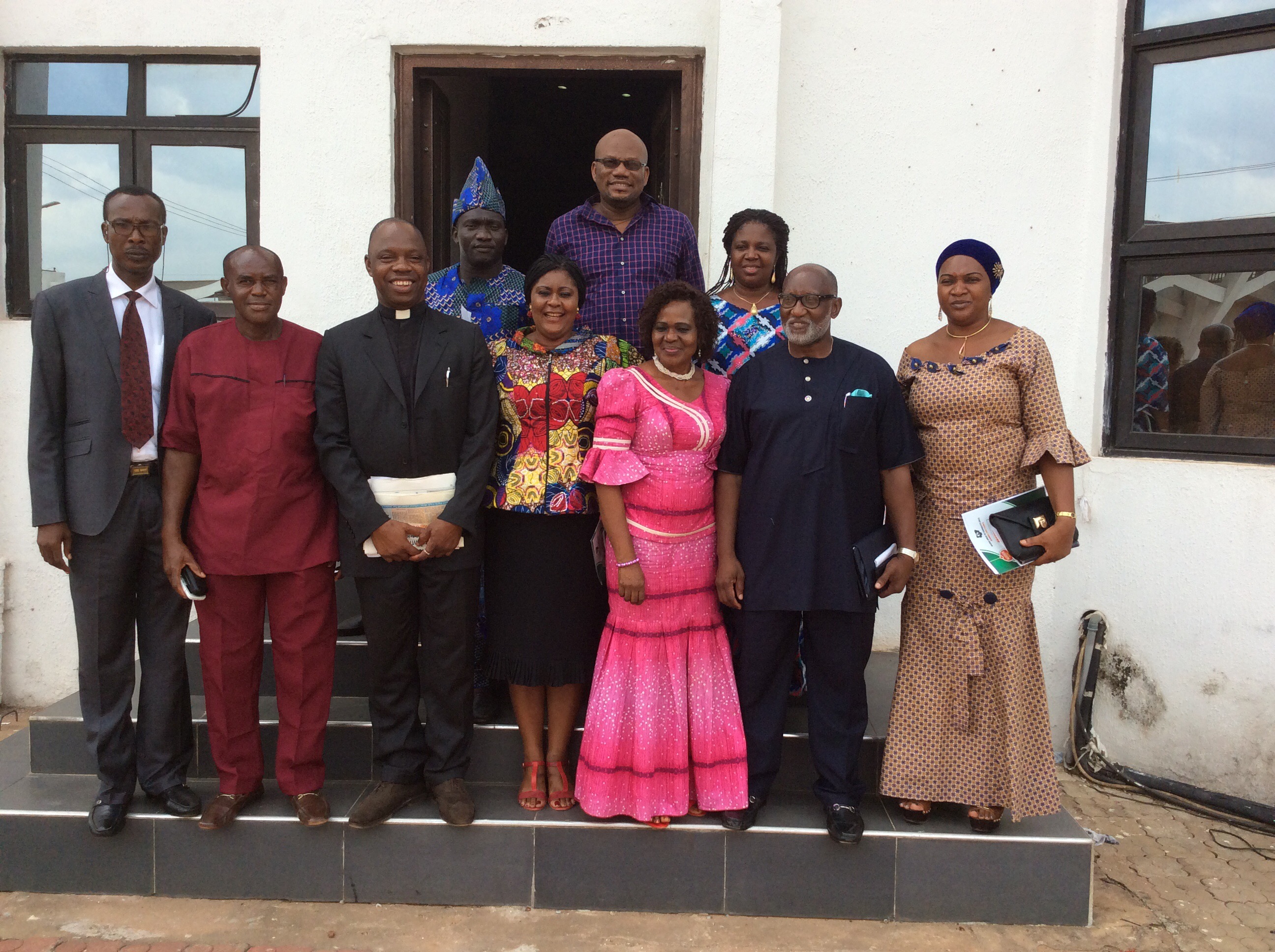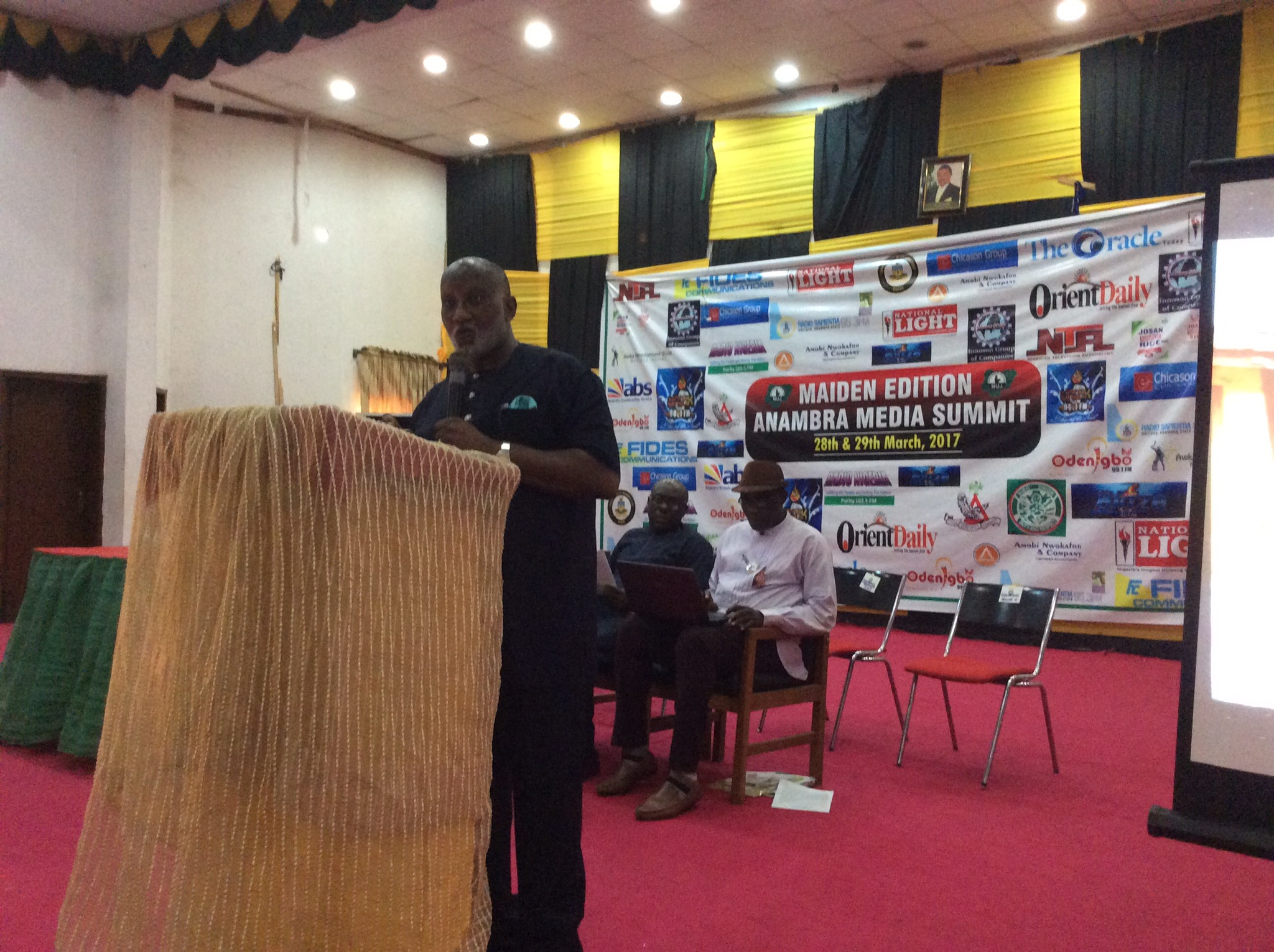Policy Briefs
Impact of Media Convergence on Good Governance in Nigeria.
- March 28, 2017
- By Oseloka Obaze, MD & CEO
- 0 Comment
Keynote Address By Mr. Oseloka H. Obaze, MD/CEO Selonnes Consult Ltd. And Immediate-Past SSG of Anambra State At the Maiden Edition of Anambra Media Summit, Prof. Dora Akunyili Women’s Development Centre, Awka, Tuesday, 28 March, 2017.
[Protocols]
It gives me great pleasure to be here. I thank the Media Summit Committee of the Nigeria Union of Journalists, Anambra State Council for their kind invitation. I feel exceptionally privileged to have been asked to deliver this keynote address for this maiden edition of Anambra Media Summit.
And so, let me first express my profound gratitude to the Nigerian Union of Journalists (NUJ), Anambra Council for organizing this maiden media summit, aptly titled, “Vision Anambra Next,” which provides an important platform to discuss the past, the present and most importantly the future of this state, which all of us hold so dear.
Summits such as these offer us the opportunity to network; share experiences in lessons learned, best practices, and missed opportunities; and most importantly, they are tools for assessing mainstream media’s role is supporting good governance as well as its institutional role in capacity-building and confidence building measures. In the end, they serve as veritable tools for molding opinion that shape the kind of society we want to live in.
My job this morning is easy. I have been tasked simply to set the tone and kick off the discussions with a short keynote address. Other speakers, I believe, will do the heavy lifting with more intrusive, introspective and retrospective analyses. Despite my warm personal affinity to many media practitioners, I am not a media professional. I will therefore speak as an attentive observer and from the vantage point of an outsider looking in.
When I received the invitation to deliver today’s address, I instinctively knew that I wanted to talk about the “Impact of Media Convergence on Good Governance in Nigeria”. It is an important topic, particularly in this day and age, when traditional media a) is being challenged by more modern forms, not least social media – twitter, YouTube and BlogSpot—easily accessible (to content creators and consumers of all intellectual and moral persuasions) b) appears to be suffering a credibility deficit with the phrase “fake news” now common parlance, and c) perhaps more worryingly, the disruption that a combination of manipulation of new media forms and aspersions on the credibility of traditional media has wreaked on established democracies.
On a personal note, I have been privileged in life, at various times and in various capacities, to serve our country, Nigeria, the International Community and Anambra State. Thus the temptation exists to approach my task conveniently from the mindset of an accomplished and exposed person. On the contrary, I believe it will serve our common interest to tackle the issues before us, with humility, yet with forthrightness, since this summit should elicit some hardheaded questions that may stir our consciousness and collective responsibility, while underlining that though our action are seemingly negligible at the individual level, they do matter collectively and have huge, sometimes dire, consequences.
Accordingly, permit me to preface this keynote address by underlining the key role that media plays in any democratic society—something that each one of you is all too familiar with; do forgive me. I will then attempt to define the term media convergence and address the benefits and associated challenges of convergence, including the tensions that persist between traditional and new forms of media. I will then conclude with a synthesis of the salient points and some reflections on the future.
Role of the Media
Universally, the media continue to claim a niche role as the Fourth Estate of the realm. For Nigerian media, such aspiration and role is no less so, even as we encounter a redefinition of who is a journalist or media practitioners, and what are the acceptable methods of operation. Indeed, the once coveted watchdog role of the media all seems to have fizzled out. That reality presents very unique and confounding challenges. The truth be told, Nigerian media has evolved in way unimaginable. True to reality but hardly flattering, some of the changes are unsavory.
It was Thomas Jefferson, the third President of the United States of America who once said: “Were it left to me to decide whether we should have a government without newspapers or newspapers without government, I should not hesitate to prefer the latter.”
I like to think that President Jefferson refers to the power of the media. The media is simply a mirror that reflects society; its makeup, leanings, beliefs, value systems and aspirations. What could be more democratic than this? The most important byproduct of the reflection of society’s image is that it forces its members to have discussions. It is through the media that members of society exercise their constitutional right of freedom of speech and within reason, express their views and opinions on the most pertinent issue of the day. Similarly, it is the medium that educates people on issues as straight forward as the health of the President and as complex as the Government’s economic policy. The media plays the role of watchdog, provider of information and peace and consensus builder in any democratic society
However, one caveat has traditionally existed. The media remains an exclusive club, where the most dominant and the ones with the loudest voice and resources have set the agenda. Think of the intrusive influence of the CNN, Aljazeera, BBC and the VOA. The convergence of media has ushered in some change. It has led to the democratization of media. This on the face of it is a good thing.
Definition of Media Convergence
Media Convergence refers to the way information and entertainment is delivered. It refers to the amalgamation of different media forms on a single platform, which when you think about it is revolutionary. What do I mean by that? – Look back five to ten years! When you wanted to read the mail it came in an envelope; when you wanted to watch a movie you had to go to the cinema, when you wanted to phone someone you had to find a payphone and when you wanted to listen to music or the news you had to do so on a radio or TV. Nowadays anyone with a smartphone can take photos and watch a video, make a podcast and connect to someone else by phone, email, twitter or a BlogSpot. Anyone with a smart phone has in theory access to a vast audience that’s – MEDIA CONVERGENCE.
The most comprehensive definition I found is provided by the Encyclopedia Britannica, which states that it is a “phenomenon involving the interconnection of information and communication technologies, computer networks, and media content. It brings together the “three C’s”—computing, communication, and content—and is a direct consequence of the digitization of media content and the popularization of the Internet… Continuing, Encyclopedia Britannica, says media convergence “transforms established industries, services, and work practices and enables entirely new forms of content to emerge. But it warned that the situation we now have “erodes long-established media industry and increasingly uncouples content from particular devices, which in turn, presents major challenges for public policy and regulation.
Media content, in my usage of it this morning, refers to a piece or pieces of information or experience(s) directed toward an end user which may be expressed in the form of; speech, articles, opinions, op-eds, reports, comments, news, news commentaries, analysis, posts, updates, graphics, visuals, sound, etc. This is particularly so because the advent of the internet, computers, mobile devices and most poignantly, our acceptance of it as a way of life has transformed, or rather disrupted the entire system of media content delivery.
Yet, not too long ago, before media content is presented publicly, it goes through a series of filters. It does not matter where you get the media content from; whether it is on the screen of your television, the speaker of your radio set or the pages of your favorite bulletin, journal, newspaper or magazine, the process remains the same – it must have gone through series of filters before it got to you. That process is what separates the reporter or script writer and the veto -wielding editor, who has the final say on what gets published.
But technological advancement has upended this rich, highly respected and regimented noble world order. Now anybody with access to a smartphone and the internet can post media contents, even in real time – a power exclusively held before now by media establishments. Positive as this may seem, it has created a deep crises of legitimacy within the mainstream media.
As I outlined earlier, while Media Convergence is generally positive, there are considerable challenges associated with a media landscape in which Obi in Awka or Timi sitting in his room in Port Harcourt can disseminate information – news- to a vast audience (within Nigeria and strikingly outside Nigeria) with a click of a button. While traditional media – one would hope- is sufficiently regulated, the Internet is not. —Is there a need to regulate the Internet? — How can we achieve some sense of quality control which ensures that information – news -, which is placed online, is “fully, accurately and fairly reported?” This is important as the dissemination of news – fake news – after all, can have significant…damning influence on society as a whole.
Crisis of Legitimacy Within the Mainstream Media
Today the mainstream media faces a considerable crisis of legitimacy. Take the U.S. for example, where according to Gallup’s annual confidence poll on the public’s trust in the mass media “to report the news fully, accurately and fairly” has reached an all-time low. Only 32 per cent of those questioned said they still had trust in the mainstream media. Reasons for this decline in confidence are multifold and include high profile missteps by the media, the media being perceived as too hostile or what I would term, ‘the politicization’ of media outlets, which have become increasingly partisan.
But these challenges are not limited to the U.S. While we in Nigeria may not currently indulge in sophisticated polls to measure the public’s discontent with the media, it is all too apparent that the Nigerian media landscape also suffers from a legitimacy deficit — and we are used to it. We live in a country where politicians and operatives have hijacked the media. Newspapers and television channels, if not already taken over by dubious characters engage in rent-seeking behavior, they allow themselves –for the right price- to be used as a mouthpiece, promoting the narrow and often selfish personal interests of the highest bidder. Rather than scrutinize the actions of Government, the media hypes the government’s performance. They publish stories that are not fact checked or are plainly wrong.
As I outlined in my introduction, media convergence in a sense, led to the democratization of news as its dissemination is no longer in the hands of the powerful few. Consequently, Timi’s ability to disseminate news should be a welcome development, as he can post stories the traditional media would often not cover, such as a government crackdown of protesters or the plight of the ordinary man in his community. He can reach and educate an audience that would otherwise not have access to information. All by a click of a button!!! As some will argue, social media in swept President Buhari’s coalition into power despite the fact that it was not as well funded and/ or organized as President Jonathan’s campaign. The ordinary man finally had his say!
Yet, Obi or Timi’s ability to reach the Nigerian public by the push of the button can be extremely dangerous, as they can create panic by promoting falsehoods. They can cause pain by promoting hate. And while traditional journalists are trained to be neutral in their reporting, Obi and Timi can tweet and post their views in utter disregard of the truth and the feelings of members of society. But even worse, Obi and Timi are not by any measure accountable to anyone and can often not be held accountable, i.e. if they can be identified as the one posting or tweeting information in the first place.
You may well recall a recent embarrassing situation the Nigeria Army found itself in when its men were caught on camera brutalizing a crippled civilian at Onitsha. The amateur video, which was widely circulated on social media and later harped on by traditional media, was apparently recorded with a smartphone. Sure, fearless journalists could have recorded the video or reported the event, but it will scarcely meet the editorial requirements of most media establishments, including big media corporations who, experience has shown, prefer to “stay out of trouble,” or remain mainstream.
Nonetheless, this democratization of media content delivery presents a huge opportunity, in that it gives voice to the voiceless and draws attention to several things, which established media have to draw attention to. But such realities present unique challenge.
Emerging media trends would have been easier to combat if information dissemination is solely in the hands of traditional media establishments, but to wish that social media will just disappear is pure fantasy. It is projected that there will be six billion smart phone users by 2020. The projections are indicative that half of this number, which is three billion people, will be active on social media. That means that more and more people will be directly involved in the democratized business of media content delivery. Make no mistake, we can’t win, if we decide to fight social media but we can carefully harness it to reap its benefits and mitigate its impact. Yet if totally ignored, social media can upend our collective social balance.
Against the worrying backdrop of rising false news, according to a recent study carried out by the Media Insight Project, nearly ninety percent say it’s extremely important that the media get their facts correct. Although one can argue that the definition of the word “correct” is subjective, about four in ten people surveyed, say they can remember a specific incident that eroded their confidence in the media, most often one that dealt with accuracy or a perception that it was one-sided.
There are growing instances when the media amplify claims by public officials that they cannot authenticate. Such situations arise, notwithstanding that the mass media as an influencer of public policy, owe a duty of care to fact-check all claims. Not doing so is a breach of covenant, which has deleterious consequences on the society.
Yes, some of us in governance, in connivance with career sycophants surrounding us, “just can’t believe” as Gimba Kakanda puts it, “that one can be legitimately critical of poor governance.” To this group, any critic must be sponsored, have agenda, be a sworn traducer of the government or is seeking for cheap popularity. To those of you who tell the truth, keep it up! Don’t allow the truth to be annihilated. But there are known media content deliverers who cannot report anything good about an administration no matter what the circumstances are. And I chose my words carefully here “CANNOT”. This situation is equally as dangerous as the first.
Another cause for worry is the increase of politically elicited spurious media awards that hype performance of government officials, but more often than not, undermines societal development. Pardon me if I have a different view of it but the essence of celebrating resourceful leaders is to recognize their efforts, cast them as role models and inspire others to contribute more to the society. The sorry sight that we behold these days is awards given to public officials, who deliver anything but good governance. Imagine the kind of society we will have, if keep rewarding and endorsing not-so-salutary accomplishments. We must not fail to remember the good old days when honesty, discipline and hard work were rewarded; it’s no longer so but we can reverse this dangerous march to perdition.
Don’t get me wrong, I’m not against the existence of “cordial relationships” between governments and the mass media. My contention is that such relationships should not be allowed to continue in a manner that defeats the whole purpose of governance.
More so, the scenario that Fortune Magazine described as “click economy” has driven even traditional, mainstream media outlets to focus on sensationalism, quick hits, headlines and viral stories even if they have little truth to them. The danger is that even when such stories are corrected, or the body of the story contradicts the charming headline, only a small number of people will read, see or share the correction or the details.
Conclusion
This is clearly confusing? — In Nigeria we have situation where the traditional media, which is supposed to report the news fully, accurately and fairly often comes short. — We have a traditional media that should educate the public but often misinforms them instead — and instead of scrutinizing the government — well it often times turns the other side. We have a media that does not carry out its democratic functions. As a result the traditional media has lost credibility in the eyes of many.
I refuse to yield to the temptation of pretending that I don’t understand that some of these attitudes have spread because of an increasing desperation for revenue. But we can no longer afford to sacrifice our society on the altar of cheap profits.
At the same time we have new forms of media that while generally positive in that they democratize the news, often – and excuse repetition – fails to report news fully, accurately and fairly and misinforms society. Consequently, there is often not much between these two forms of media when it comes to content.
Global and localized trends suggest that hate speeches, demagoguery and fake news are on the rise. It is as if we now live in a post truth world. We can afford to fold our hands and do nothing if the danger presented by this reality is a matter of light consequence but the media, as we all know it, is the very fulcrum on which other components of the society rest. We have had experiences that painfully taught us that no information is dangerous but wrong information could be much more dangerous and can throw nations into chaos.
In closing, my appeal to journalists across the country is NOT to fight media convergence or abandon new forms of communication. To the contrary, I urge journalists as media practitioners to embrace media convergence and the new communication tools. However, I implore you to be fierce defenders of the truth, of accuracy and fairness when reporting – be watchdogs of our democratic system by engaging in investigative journalism – be educators of the public and do so by living up to the high standards your profession has set for itself. Carry out your civic duty!!! That’s the only way you can regain the trust of the public and push back on “fake news” a phenomenon that is here to stay, regardless of any regulation we may impose on the use of the Internet! If you commit to doing this, our Republic will go from strength to strength and so will Anambra State.
Thank you for your kind attention and God Bless.
http://www.fidesnigeria.org/index.php/frontend/column/readcolumnarticle/c850i8x0ib/61o8q92906
Oseloka Obaze, MD & CEO
Mr. Obaze is the former Secretary to the State Government of Anambra State, Nigeria from 2012 to 2015 - MD & CEO, Oseloka H. Obaze. Mr. Obaze also served as a former United Nations official, from 1991-2012, and as a former member of the Nigerian Diplomatic Service, from 1982-1991.
Tags
Welcome to Selonnes Consult / OHO and Associates
Selonnes Consult Ltd. is a Strategic Policy, Good Governance and Management Consulting Firm, founded by Mr. Oseloka H. Obaze who served as Secretary to Anambra State Government from 2012-2015; a United Nations official from 1991-2012 and a Nigerian Foreign Service Officer from 1982-1991.
Recent Posts
- Policy Brief No. 24-7| Overcoming Nigeria’s Legacy of Woes
- Policy Brief No. 24-6| Nigeria’s Not Too Big To Fail By Oseloka H. Obaze
- Policy Brief No. 24-5 | Nigeria’s Opposition Abet APC’s Grim Governance
- Policy Brief No. 24-4 |Blame Game Is Not Policy Game
- Policy Brief No. 24-3 | Implementing Oronsaye Report – No Walk in the park..
Categories
- #BuFMaNxit
- #EndSARS
- 2020 appropriations
- 2023 Appropriations
- 2023 buget estimates, 2024 budget estimate, FGN
- 2023 Liberian general elections
- 2024 Approriations
- Abia State
- Abuja
- Afghanistan
- Africa
- Africa’s largest economy
- AGF Malami
- Agonizing reprisals
- Alumni Association
- Aminu Waziri Tambuwal
- Amotekun
- Anambra
- Anambra Integrated Development Strategy
- Anambra state
- ANIDS
- Announcement
- Announcements
- Anonymous
- Apartheid
- APC
- APC, continuity in governance, budget performance
- Atiku Abubakar
- Bad Governance
- Bandits
- Beyond oil economy
- Bi-partisan caucus
- Biography
- Boko Haram
- Bola Tinubu
- Book Review
- Budget making
- Buget Padding
- Buhari
- Building Coalition
- Bukola Saraki
- Burkina Faso
- CAC
- Capacity building
- Capital Flight
- Career Counseling
- Central Bank of Nigeria
- Central Minds of Government
- Chief Security Officers
- Chieftaincy
- China
- Chinese doctors
- Chinua Achebe
- Civil Service reform
- Civil Society
- Civilian joint task force
- CKC Onitsha
- Clientel
- Climate Change
- Community policing
- Community resiliency
- Community transmission
- Conferences
- Consitutional Reform
- Constitutional Rights
- COP28
- Corona Virus Facts
- Corporate Exits,
- corporate social responsibility
- Cost of governance
- Coved 19 management
- Covid 19 Case Load
- Covid 19 vaccine policy
- Covid-19
- Cross political tier aspirations
- CSOs
- Culture
- Curriculum Vitae
- Customer Relationship
- Cutting Cost of Governance
- Cyril Ramaphosa
- Democracy
- Demolitions in Nigeria
- Development
- Disaster response
- Diseent
- Domestic terrorism
- Donald Trump
- Doublethink
- Ebola
- Economic Policy
- Economy
- ECOWAS
- Education
- Elections
- EMS
- Enabling environmrnt
- Endogenous solutions to conflict
- EndSARSnow
- Enugu state
- Environment
- Environmental degredation
- Escalatory measures
- EU
- Events
- Executive Order No. 5
- Fake news
- Fake news versus freedom of speech
- Farmers/Herdsmen conflict
- Fatalities
- Faux Policies
- FGN
- First Responders
- Fiscal Policy
- Fishermen
- Flooding
- Food security
- Forced Removals
- Foreign exchange
- Foreign Policy
- Full disclosure
- Gen Soliemani
- Gender inclusion
- Gender mainstreaming
- Gender parity
- Gender Policy
- General News
- Generator Country
- Genocide
- Girl-child
- Global best practices
- Global Compact
- Global housing crisis
- Global insecurity
- Global pandemic
- Global respone
- Good Governance
- Grazing areas
- Groupthink syndrome
- Habitat
- Hate Speech
- Herdsmen
- Hisbah security outfits
- History
- Housing Deficit
- human capital
- Human development capital
- Human rights violations
- Human Security
- IGR
- INEC
- Insecurity
- Inter-community conflicts
- International relations
- Interview
- iOCs
- Iran
- Iraq
- Joe Biden
- Joe Garba
- Judiciary
- Kamala Harris
- Kankara
- Kano
- Kaño State
- Katsina State
- Kidnapping
- King Louis IX.
- Kofi Annan
- Labour Unions
- Lady Chidi Onyemelukwe
- Lagos
- Leadership
- Leadership hubris
- Legislative oversight
- Lesotho
- Libel
- Liberia,
- Literary Event
- Lock down
- Malgovernance
- Mali
- Media
- Media accountability
- Migration
- militancy
- Military coups in Africa
- Millennium Development Goal
- Minister of Health, Dr Osagie Ehanire
- Misgovernance
- Mitigation
- MNCs
- Motivational Speeches
- Muhammadu Buhari
- NAFDAC
- NASS
- Nation building
- National interest
- National resiliency strategy
- National Security
- Nationalists,
- NATO
- Natural Disaster
- NCDC
- NDA – the Nigerian Defence Academy
- NEMA
- New York Times
- Niger
- Niger Delta
- Nigeria
- Nigeria Medical Association
- Nigerian Economy
- Nigerian elite, democracy
- nigerian military
- Nigerian Senate
- Nigerian Society of Writers
- Nigerian Supreme Court.
- Nigerian Youth
- Nigerian-German relations
- NMA
- Nobel Peace Prize
- Non-state actors
- Novel corona virus
- Obituary
- oil prices
- Oil subsidy
- Onitsha
- Op-Ed.
- Operational Activities
- Opposition Politics
- Oronseye Report
- Oseloka H. Obaze
- Pacesetter Frontier Magazine
- Palliatives
- Pandemic
- Party politics
- Party Politics In Africa
- Pastoral Conflict
- PDP
- PDP Governorship Candidate
- Peace and security
- PENCOM
- Pension contributions
- Peter Obi
- Petroluem policy
- philosophy
- Piracy
- Police Brutality
- Policy Brief
- Policy Making
- Policy transparency
- Political Economy
- Political economy.
- Political exclusion
- Political inclusion
- Politics
- Power and Energy
- Press Remarks / Press Releases
- Preventive measures
- Prime Witness book presentation
- Proactive Policing
- Promotions & Offers
- Public Notice
- Quarantine
- R & D
- Racial inequality
- Regional blocs
- Regional hegemon
- Regional security network
- Regulatory Policies
- Renewable energy
- Research and development
- Responsibility to protect
- Restructuring
- Rule of law
- Russia
- Rwanda
- Safety Net Hospital
- Saigon
- SARS
- SDG
- Seasonal Floods
- Security
- Sedition
- Selonnes Consult
- SEMA
- Senator Hope Uzodinma
- Senator Stella Oduah
- Senator Uche Ekwunife
- Separation of Powers
- Services
- Shale tecnology
- Shelter in Place
- Six geopolitical zones
- SMes UNIDO
- Social distancing
- Society for International Relations Awareness (SIRA)
- South Africa
- Southeast Nigeria
- Special Intervention Programme (SIP)
- Speeches
- State police
- State vigilantes
- Stay at home order
- Stay home orders
- Strategic planning
- Strength of Government
- Tampering with free speech
- Taxes
- Technology
- Tecnology
- The Blame Game
- The Peter Principle
- The Policy Game
- Think Tank
- Three Arms of government
- Three Tiers of Government
- Treason to the Constitution
- Tributes
- Tweets
- U.S.
- UN
- UN peacekeeping
- UN sanctions
- Uncategorized
- UNEP
- Ungoverned space
- Ungoverned space,
- United Nations
- United States
- Unity Party of Liberia
- Upcoming Events
- US strategic interest
- Value added tax
- Wale Edu
- Ways and Means
- West Africa and Sahel
- White House
- Women for Women
- Women in politics in Nigeria
- World Bank
- Xenopbobia
- Yemi Osinbajo
- Youth
- Zoning,
Archives
- June 2024
- March 2024
- February 2024
- January 2024
- December 2023
- September 2021
- August 2021
- July 2021
- April 2021
- March 2021
- January 2021
- December 2020
- November 2020
- October 2020
- September 2020
- August 2020
- July 2020
- June 2020
- May 2020
- April 2020
- March 2020
- February 2020
- January 2020
- December 2019
- November 2019
- October 2019
- September 2019
- August 2019
- July 2019
- June 2019
- May 2019
- November 2018
- October 2018
- September 2018
- August 2018
- July 2018
- June 2018
- May 2018
- April 2018
- March 2018
- February 2018
- January 2018
- December 2017
- November 2017
- October 2017
- September 2017
- August 2017
- July 2017
- June 2017
- May 2017
- April 2017
- March 2017
- February 2017
- January 2017
- December 2016
- November 2016
- October 2016
- September 2016
- August 2016
- July 2016
- June 2016
- May 2016
- April 2016
- March 2016
- February 2016
- January 2016
- December 2015
- November 2015
- October 2015
- September 2015
- July 2015
Contact Info
MD & CEO
Oseloka H. ObazeA301 Chukwuemeka Nosike Street, Suite # 7, Awka, Anambra State, Nigeria
Phone: NG: 0701-237-9333Mobile: US: 908-337-2766Email: Selonnes@aol.com, Info@selonnes.com

